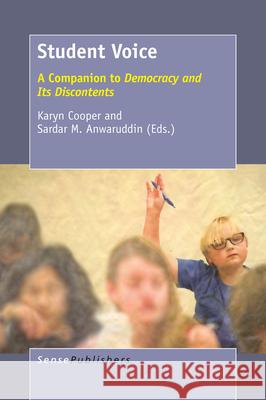Student Voice » książka
Student Voice
ISBN-13: 9789463004077 / Angielski / Twarda / 2016 / 182 str.
Student Voice
ISBN-13: 9789463004077 / Angielski / Twarda / 2016 / 182 str.
(netto: 420,89 VAT: 5%)
Najniższa cena z 30 dni: 423,64
ok. 22 dni roboczych.
Darmowa dostawa!
Student Voice: A Companion to Democracy and Its Discontents serves two primary purposes. First, as the title of the volume suggests, it serves as a companion text to Democracy and Its Discontents: Critical Literacy across Global Contexts (Sense Publishers, 2015). Second, the volume features critical dialogues between emerging and established scholars in the field of critical literacy education, broadly defined. It brings together a collection of essays that speak to the possibilities of taking a critical approach to language and literacy education. The contributing authors draw on their life stories and professional experiences to make a strong case for taking a critical approach to education. They demonstrate that the act of teaching always involves a grappling with the entanglement of social, cultural and political forces. In this sense, education is always a normative and ethical enterprise. The authors featured in this book will encourage readers to re-imagine critical education and its emancipatory potential in an age of neo-conservative and corporate assaults on education. This volume, written in a lucid and accessible manner, will appeal to a broad readership interested in education. It will be an informative and engaging text in graduate and undergraduate courses on language and literacy education, teacher education, education policy studies, and curriculum studies. In-service teachers, teacher-educators, and school administrators will also find it to be a valuable resource.
Student Voice: A Companion to Democracy and Its Discontents serves two primary purposes. First, as the title of the volume suggests, it serves as a companion text to Democracy and Its Discontents: Critical Literacy across Global Contexts (Sense Publishers, 2015). Second, the volume features critical dialogues between emerging and established scholars in the field of critical literacy education, broadly defined. It brings together a collection of essays that speak to the possibilities of taking a critical approach to language and literacy education. The contributing authors draw on their life stories and professional experiences to make a strong case for taking a critical approach to education. They demonstrate that the act of teaching always involves a grappling with the entanglement of social, cultural and political forces. In this sense, education is always a normative and ethical enterprise. The authors featured in this book will encourage readers to re-imagine critical education and its emancipatory potential in an age of neo-conservative and corporate assaults on education. This volume, written in a lucid and accessible manner, will appeal to a broad readership interested in education. It will be an informative and engaging text in graduate and undergraduate courses on language and literacy education, teacher education, education policy studies, and curriculum studies. In-service teachers, teacher-educators, and school administrators will also find it to be a valuable resource.











